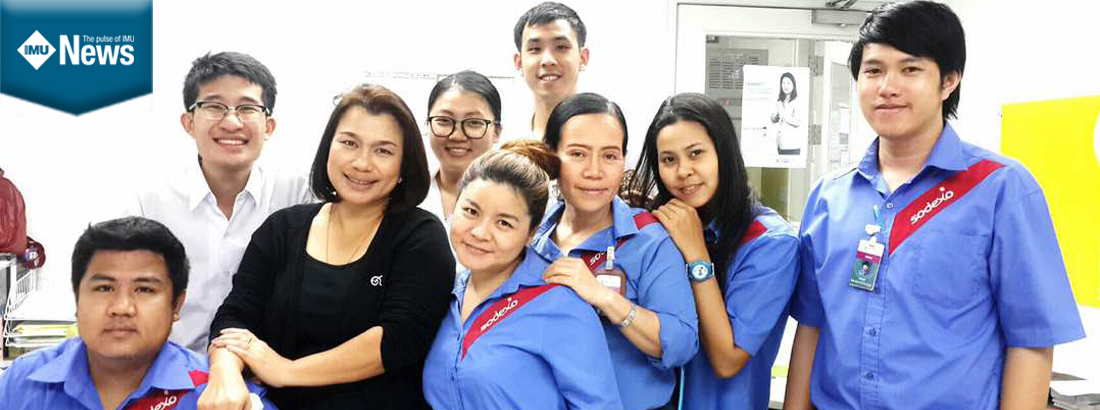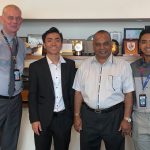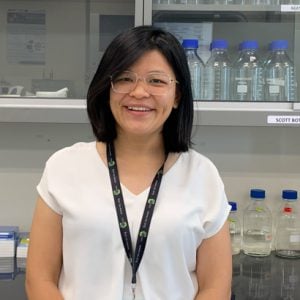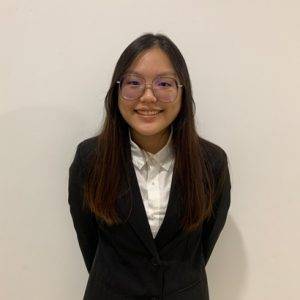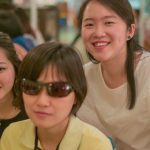Three Semester 8 Dietetics with Nutrition students from International Medical University (IMU), Malaysia, Yap Thien Vern, Lim Wan Ying and Wong Wei Xiang, had the opportunity to undergo a 3-week attachment at a private hospital in Thailand. Here, the students share with us their experience during this attachment. “For us, food has always been an interesting topic, whether to debate on where to eat our daily lunch or in our profession, how to improve someone’s health through diet. As future dietitians, not only do we need to understand the science of food and its nutrition, we also need to understand how it is prepared, various food culture and beliefs as well as modifying the food to become healthy but palatable. As globalisation increases, our palates are becoming more global with Thai food being a much sought after cuisine. This has resulted in us choosing to go to Bangkok, the most visited city in the world, for our attachment and to experience its diverse food culture.
We were fortunate enough to get accepted by Sodexo Thailand, a company that manages the food service operations at Bumrungrad International Hospital, to observe and participate in their food service operations for 3 weeks during our attachment there in December 2016. Being one of the popular places for medical tourism, Bumrungrad International Hospital has been internationally recognised and ranks at number 9 of the top ten hospital in the world.
We left Malaysia in December 2016 and came back after a month having gained more experience in the various fields of the dietetics. The 3 weeks in Thailand were very well spent. We were fortunate to have Ms Cherry to guide us as the staff in the kitchen at Bumrungrad International Hospital are more conversant in their mother tongue. It also made the whole experience more fun when we get to learn a new language. Everyone was very kind and helpful, ensuring that we have achieved our learning objectives throughout the 3-week attachment. 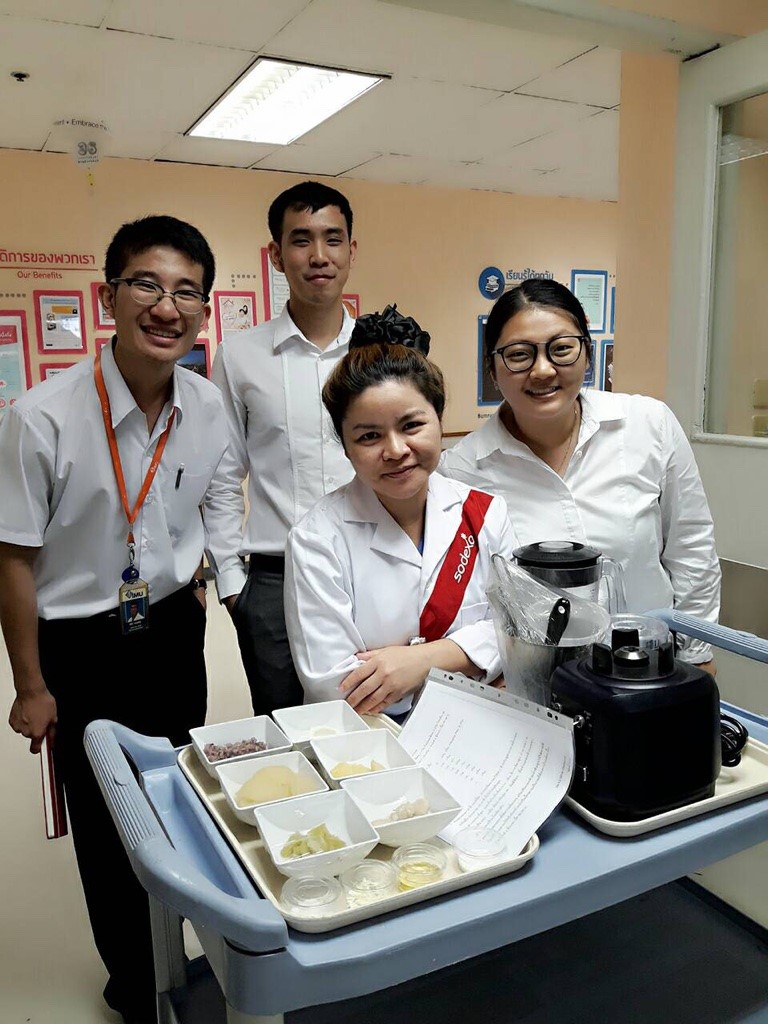 Throughout the attachment period, we were shown around their food service operations, inpatient wards and their general working procedures. We were also given opportunities to actively participate in the work process and have hands-on experience in the kitchen. We were placed in the various kitchens in the hospital, eg. Japanese kitchen, Halal kitchen, Chinese kitchen, Thai kitchen and Western kitchen, to help with food preparation and plating. On top of that, we were also given the chance to visit patients to obtain their diet orders according to their personal preference and tailor it to their medical conditions. On a side note, a dietitian was also kind enough to drive us out to a city that is located approximately 2 hours drive away from Bangkok to have a field trip. In Thailand, most of the salt used comes from brine salt-farms, and the largest number of these brine salt-farms are close to Bangkok, in Samut Sakhorn. We wandered into one of the lots and met a few salt farmers there. It was interesting to learn about one of the most commonly found flavour enhancer on all eating tables. Aside from spending our time at work, we enjoyed the time after work and during the weekends to explore around the city. Thailand is a country that has attracted tourists for its rich and spicy cuisine. Street food is easily found on every street; a dish of grilled chicken/fish, mango sticky rice, spicy papaya salad…we never ran out of options of what to get for the next meal. Over the weekends, we spent most of our time exploring around the floating markets, railway market, night markets and historical places. As future dietitians, we love the diversity of Thai food and appreciate the culture that shapes a person’s eating habit. One of the main learning outcomes was the exposure to view a different work culture and ethics. Thai people were extremely friendly, joyful but when it comes to work, they worked extremely efficiently and effectively. It was amazing seeing such a small group of people dishing out 500-800 meals for at least 3 times in a day. The food that was available was also one of our greatest experiences, to be able to see the differences in their food culture compared to ours. Nonetheless, we had a great time enjoying the food in Bangkok.
Throughout the attachment period, we were shown around their food service operations, inpatient wards and their general working procedures. We were also given opportunities to actively participate in the work process and have hands-on experience in the kitchen. We were placed in the various kitchens in the hospital, eg. Japanese kitchen, Halal kitchen, Chinese kitchen, Thai kitchen and Western kitchen, to help with food preparation and plating. On top of that, we were also given the chance to visit patients to obtain their diet orders according to their personal preference and tailor it to their medical conditions. On a side note, a dietitian was also kind enough to drive us out to a city that is located approximately 2 hours drive away from Bangkok to have a field trip. In Thailand, most of the salt used comes from brine salt-farms, and the largest number of these brine salt-farms are close to Bangkok, in Samut Sakhorn. We wandered into one of the lots and met a few salt farmers there. It was interesting to learn about one of the most commonly found flavour enhancer on all eating tables. Aside from spending our time at work, we enjoyed the time after work and during the weekends to explore around the city. Thailand is a country that has attracted tourists for its rich and spicy cuisine. Street food is easily found on every street; a dish of grilled chicken/fish, mango sticky rice, spicy papaya salad…we never ran out of options of what to get for the next meal. Over the weekends, we spent most of our time exploring around the floating markets, railway market, night markets and historical places. As future dietitians, we love the diversity of Thai food and appreciate the culture that shapes a person’s eating habit. One of the main learning outcomes was the exposure to view a different work culture and ethics. Thai people were extremely friendly, joyful but when it comes to work, they worked extremely efficiently and effectively. It was amazing seeing such a small group of people dishing out 500-800 meals for at least 3 times in a day. The food that was available was also one of our greatest experiences, to be able to see the differences in their food culture compared to ours. Nonetheless, we had a great time enjoying the food in Bangkok.
We are extremely grateful to IMU for allowing us to have this opportunity to add to our learning experience as we transition into practicing dietitians in the near future. We are certain that with the knowledge obtained from this trip, we will become more effective in helping people with their diet for better health outcomes. It was truly a great experience to learn about the food service practices in a private hospital that serves multi-national patients.”




